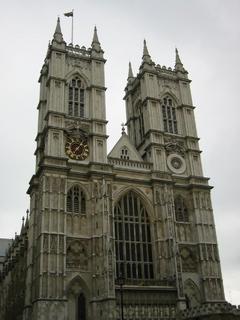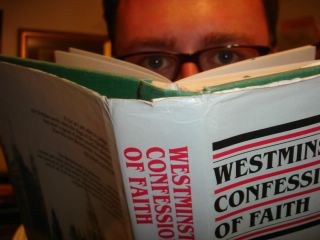
WE LIVE IN A FAST paced world. News is available "up to the minute" and information is constantly being thrown towards us. We never take the time to sit and to listen. We do not take time to say, "be still my soul...listen." Due to the pace with which our society moves, we do not remember cliches such as, "good things come to those who wait."
This also applies to our spiritual lives. When I first was coming into the Reformed faith my minister reminded me that "it is not he with the most zeal will be saved, but he who perseveres to the end shall be saved." We want to see people that "are on fire", "filled with zeal", and "passionate" about the Christian faith. These things are okay when taken at face value, but in reality when I reflect on my Christian experience the people that were once those things are no longer in the faith. Jesus teaches us that there are those seeds who fall on rocky soil and they spring up quickly but do not last. These plants have no roots.
What does this have to do with meditation?
The Christian life is one that is filled with questions: doctrinal, practical, ethical, personal, etc. One practice that is not considered much in our new age filled era is that of meditation.
When one says mediation, quickly images of cross legged Buddists come to mind, or that of the monkey from the Lion King. Obviouosly this is not what we mean by Christian meditation.
In Puritan Christianity there have been many definitions that are helpful in understanding meditaion. One that I enjoy is, "talking to yourself before God". The point is that we openly talk to ourselves in persuit of God giving us understanding through His Word. (This is a needed point: all meditation is on and through the Word of God.) This is where we take that which we know in our heads and we apply to our lives. (Orthodoxy and Orthopraxy).
I hope that the following is helpful. It is from Professor AG Haykins' publication entitled Eusebia.
A DEFINITION
On the topic of Puritan meditation, James Packer writes, "Knowing themselves to be creatures of thought, affection, and will, and knowing that God's way to the human heart (the will) is via the human head (the mind), the Puritans practiced meditation, discursive and systematic, on the whole range of biblical truth as they saw it applying to themselves." In a similar vein, Horton Davies describes Puritan meditation as "moving from intellectual issues to exciting the heart's affections in order to free the will for conformity to God."This approach to meditation stems from the Puritans' conviction that the will is a "blind" faculty. According to Edward Reynolds (1599-1676), the will "cannot see the right good it ought to affect without the assistance of an informing power" nor "can it see the right way it ought to take for procuring that good without the direction of a conducting power." This "informing" and "conducting" power is the understanding-the leading faculty of the soul. When this "noblest faculty," as Stephen Charnock (1628-1680) calls it, is "employed about the most excellent object," it informs and conducts the will via the affections to choose the "right good."With this paradigm firmly in place, George Swinnock (1627-1673) defines meditation as "a serious applying the mind to some sacred subject, till the affections be warmed and quickened, and the resolution heightened and strengthened thereby, against what is evil, and for that which is good.
THE METHOD OF MEDITATION
According to Swinnock's definition, the method of meditation is serious applying the mind. . . till the affections be warmed and quickened. This method dates hack to Joseph Hall (1574-1656), who affirms that "the practice of true piety" is contingent upon meditation - "the best improvement of Christianity." He defines this meditation as 'a bending of the mind upon some spiritual object, through divers forms of discourse, until our thoughts come to an issue.' This bending of the mind has two forms: "extemporal" and "deliberate." Hall focuses upon the second, seeking to describe its "proceeding."In brief deliberate meditation "begins in the understanding, endeth in the affection; it begins in the brain, descends to the heart; begins on earth, ascends to heaven, not suddenly but by certain stairs and degrees till we come to the highest." Hall divides these "stairs and degrees into two sections. The first concerns the practice meditation in the understanding.It involves the study of divine truths according to certain "heads": description, division, effects, subjects, qualities, contraries, comparisons, titles, and testimonies. The second concerns the practice of meditation in the affections. For Hall, this "is the very soul of meditation, whereto all that is past serveth but as an instrument." It involves the pressing of divine truths upon the affections through seven steps: taste, complaint, hearty wish, confession, petition, enforcement, and confidence. James Ussher (1581-1656) also recommends this two-pronged approach, stating that the "work" of meditation consists of the "two principal faculties of the soul; First, the Understanding, to which I refer the Memory; Secondly the Will, to which I refer the Affections." The first involves a "calling to mind" whereby biblical truths are remembered and debated. The second involves a "laying to heart" these truths.Swinnock describes this "laying to heart" as "serious consideration" or "an act of the practical understanding, whereby it reflecteth upon its actions and intentions, and comparing them with the rule of the word, proceedeth to lay its command upon the will and affections to put what is good in execution." This "reflection" usually consists of soliloquies, which Richard Baxter (1615-1691) defines as "awakening questions." These are designed to make people feel the pulse of their soul for the purpose of self-evaluation. For Ussher, this is the "main business" of meditation - "to see how the matter stands between God, and my own soul." With this goal in view, he suggests, "First look backwards, and say, what have I done? Secondly look forwards, and say, what will I do?" Similarly, William Gurnall (1617-1679) writes, "Reflect upon thyself, and bestow a few serious thoughts upon thy own behaviour-what it hath been towards God and man all along the day.
THE OBJECT OF MEDITATION
In his definition, Swinnock describes the object of meditation as "some sacred subject." For his part, Hall speaks of "those matters in divinity which can most of all work compunction in the heart and most stir us up to devotion." In all, there are seven "sacred" subjects that figure prominently in Puritan meditation.The first is the majesty of God. "Above all," writes Swinnock, "meditate on the infinite majesty, purity, and mercy of that God against whom thou hast sinned." Charnock concurs, "Be often in the views of the excellencies of God." Gurnall encourages his readers to meditate on the "infinite holiness of God." Similarly, Baxter directs his audience to "dwell on the meditations of the Almighty," adding, "One would think if I should set you no further task, and tell you of no other matters for meditation, this one should be enough; for this one is in a manner all." Baxter's urgency flows from his conviction that the "best Christian" is the one "that hath the fullest impression made upon his soul, by the knowledge of God in all his attributes."The second subject is the severity of sin. For the Puritans, the knowledge of sin and the knowledge of God are inextricably related. Swinnock explains, "Man never comes to a right knowledge of himself, what a pitiful, abominable wretch he is, till he comes to a right knowledge of God, what an excellent incomparable majesty he is." Charnock agrees, "in the consideration of God's holiness we are minded of our own impurity . . . so his immensity should make us, according to our own nature, appear little in our own eyes." In other words, people only arrive at a proper understanding of the darkness of sin in the light of God's holiness, because it is then that they see their sin as an attack against God. With this in mind, Joseph Alleine (1634-1668) urges his audience to meditate upon the "number," "aggravation," "deformity," and "defilement" of their sin.The third subject is the beauty of Christ, which is only appreciated against the backdrop of God's majesty and sin's severity. According to Alleine, "Till men are weary and heavy laden, and pricked at heart, and quite sick of sin, they will not come to Christ for cure, nor sincerely enquire, "What shall we do?" When they do arrive at this point, they see the beauty of Christ's love as he bridges the immeasurable distance between a glorious God and a sinful creature. This leads Gurnall to declare, "Bathe thy soul with the frequent meditation of Christ's love."The fourth subject is the certainty of death. "If thou wouldst exercise thyself to godliness," writes Swinnock, "think often of thy dying day." Robert Bolton (1572-1631) directs his readers to ponder the certainty that "all the pleasures, treasures, and comforts of this life... must all, upon the stroke of death . . . be suddenly, utterly, and for ever left."The fifth subject is the finality of judgment. Gurnall remarks, "Surely thou wilt not easily sleep while this trumpet, that shall call all mankind to judgments shall sound in thy ear. The reason why men sleep so soundly in security is, because they either do not believe this, or at least do not think of it seriously so as to expect it." With this lethargy in mind, Bolton instructs individuals to ponder what it will be like to give an exact account of "all things done in the flesh," to witness the disclosure of all "secret sins" and "closet villanies," and to "hear that dreadful sentence of damnation to eternal torments and horror."The sixth subject is the misery of hell. Swinnock describes hell as a "privative" misery, because sinners lose "earthly delights," "carnal contentments," "spiritual preferment," "the society of all the godly," "hope," their "precious soul," and "the infinitely blessed God." Likewise, Bolton speaks of the "privation of God's glorious presence, and eternal separation from those everlasting joys, felicities, and bliss above." Swinnock also describes hell as a "positive" misery, because of what sinners gain, explaining, "the wicked shall in the other world depart from Christ into fire. . . They shall not only be stripped of all good... but also be filled with all evil." At that time, they will gain "a perfection of sin" and "a fullness of sorrow."The seventh subject is the glory of heaven. In terms of "privative" gain, Swinnock says Christians will obtain freedom from the evil of sin, that is, freedom from the commission of sin and the temptation to sin. They will also obtain freedom from the evil of suffering. In terms of "positive" gain, they will obtain the company of perfect Christians, the nearest communion with Christ, and the full and immediate fruition of God. For Baxter, this gain is of utmost importance. "I would not have you cast off your other meditations," he says, "but surely as heaven hath the pre-eminence in perfection, it should have it also in our meditation. That which will make us most happy when we possess it, will make us most joyful when we meditate upon it."
THE RESULT OF MEDITATION
Through meditation, the significance of these "sacred" subjects is felt in the soul. A glimpse of God's majesty produces fear and love. A sense of sin's severity excites sorrow and hatred. A taste of Christ's beauty stirs delight and desire. The remaining truths, known as "the four last things," produce what the Puritans call "heavenly-mindedness." "The heavenly minded person," explains historian Dewey Wallace, is "absorbed in divine things, weaned from earth, and advanced in communion with God." Their goal is "to meditate on that state, binding one's heart so closely to God that all else pales into insignificance."According to Swinnock's definition, this "warming" and "quickening" of the affections leads to the "heightening" and "strengthening" of the will's "resolution" against "what is evil, and for that which is good." As Gurnall explains, "Affections are actuated when their object is before them. If we love a person, love is excited by sight of him, or anything that minds us of him; if we hate one, our blood riseth much more against him when before us." By meditating upon divine truths, love is stirred toward the greatest good (God) and hatred is stirred toward the greatest evil (sin). As a result, the will is resolved to pursue God and forsake sin. For time Puritans, this "resolution" manifests itself in godliness-conformity to God's will. Baxter is so convinced of this relationship between meditation and godliness that he writes, "If, by this means, thou dost not find an increase of all thy graces, and dost not grow beyond the stature of common Christians, and art not made more serviceable in thy place, and more precious in the eyes of all discerning persons; if thy soul enjoy not more communion with God, and thy life be not fuller of comfort, and hast it not readier by thee at a dying hour: then cast away these directions, and exclaim against me for ever as a deceiver."
CONCLUSION
For the Puritans, therefore, meditation is pivotal to the practice of piety. As Baxter notes, "the Spirit makes use of our understandings for the actuating of our wills and affections." This necessarily implies that meditation is one of the principal means by which the Holy Spirit sanctifies the Christian.It is for this reason that Hall much lamented the widespread neglect of meditation in his day, commenting, "If there be any Christian duty whose omission is notoriously shameful and prejudicial to the souls of professors, it is this of meditation. This is the very end God hath given us our souls for we misspend them if we use them not thus." Hall's words are as true today as the day he penned them, for as Joel Beeke observes, "One hindrance to growth among Christians today is our failure to cultivate spiritual knowledge. We fail to give enough time to prayer and Bible-reading, and we have abandoned time practice of meditation." Given this fact, we would do well to heed Gurnall's plea to "retire often to muse on some soul-awakening meditations," remembering that "if you seek her as silver and search for her as for hidden treasure; then you will discern the fear of the LORD and discover the knowledge of God."












